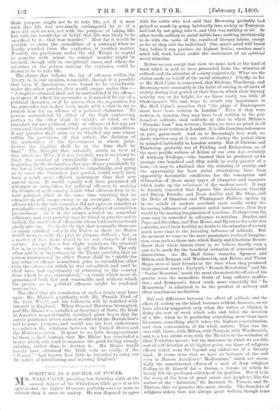THE NEW EXTRADITION TREATY.
British soil. That this result will hailed with no small amount of satisfaction in the Union, cannot be doubted for a moment, for the want of an effective system of extradi- tion has long been felt. On this side of the Atlantic, we have been accustomed to regard the question of extradition as one primarily affecting ourselves, but in reality our interests in its conclusion have been much smaller than those of the Americans. It is to them far more than to us that the matter is of practical importance. Up till now, the only arrangement in force for the delivering up of fugitive offenders has been that of the tenth clause of the Webster-Ashburton Treaty. Under it murder, assault with intent to commit murder, piracy, arson, robbery, forgery, and the utterance of forged paper, were the sole extraditable crimes. The present convention adds the following :—" (1), Manslaughter ; (2), counter- feiting or altering money, uttering or bringing into circulation counterfeit or altered money ; (3) embezzle- ment, larceny, obtaining money, goods, or valuable securities by false pretences, receiving any money, valuable security, or other property knowing the same to have been em- bezzled, stolen, or fraudulently obtained ; (4), fraud by a bailee, banker, agent, factor, trustee, or director, or mem- ber, or officer of any company made criminal by the laws of both countries ; (5), perjury or subornation of perjury ; (6), rape, abduction, child-stealing, or kidnapping ; (7), burglary, housebreaking, or shopbreaking ; (8), piracy by the laws of nations ; (9), revolt or conspiracy to revolt by two or more persons on board ship on the high seas against the authority of the master, wrongfully sinking or destroying a vessel at sea or attempting to do so, assault on board ship on the high seas with intent to do grievous bodily harm ; (10), crimes and offences against the laws of both countries for the suppression of slavery and slave-trading." It will be at once noticed that this list contains no reference to the destruction or injury of life and property by the wilful and malicious use of dynamite or other explosives. No doubt this is a very important omission, and one which may prove quite as inconvenient to the United States as to us, for the only case in which a dynamite explosion has caused any great loss of life was that of the bomb-throwing by the Chicago anarchists. Still, it must not be supposed that the use of dynamite is in any way made sacred by the Treaty, or that crime otherwise extraditable is to be sanctified by the employment of nitro-glycerine. Though persons wanted for the special offences of Sir William Harcourt's Explosives Act, under which the mere possession of dynamite may under certain circumstances become a crime, will not be extraditable, any one who has actually taken life or attempted to take it by maliciously exploding dynamite, will be liable to be given up. At least, so we read the Treaty, and we shall be much surprised if ours is not the correct interpretation. A man who had caused an explosion, say, on the Underground Railway, resulting in the death of any person, and had then escaped to America, would be clearly extraditable for murder. The doctrine as to murder which was laid down by Lord Chief Justice Cockburn in "Regina v. Desmond, Barrett, and others "—the Clerkenwell explosion case—is, we presume, held by the American Courts, and therefore they could not, even if they wished, which would be most improbable, excuse a crime because it was committed with dynamite. The Judge's words were :—" If a man did an act, more especially if that were an illegal act, although its imme- diate purpose might not be to take life, yet if it were such that life was necessarily endangered by it—if a man did such an act, not with the purpose of taking life, but with the knowledge or belief that life was likely to be sacrificed by it—that was murder." How far it would be possible to claim the extradition of a criminal when no deaths resulted from the explosion, is another matter. Possibly the provisions under the old. Treaty in regard to assaults with intent to commit murder might be invoked, though only in exceptional cases, and where the intention of the person causing the explosion could be shown to be to take life.
The clause that follows the list of offences within the Treaty, is, in our opinion, reasonable, though it is possible that even if dynamiters were found to be extraditable under the other articles, they would escape under this :— " A fugitive criminal shall not be surrendered if the offence in respect of which his surrender is demanded be one of a political character, or if he proves that the requisition for his surrender has in fact been made with a view to try to punish him for an offence of a political character. No person surrendered by either of the high contracting parties to the other shall be triable, or tried, or be punished for any political crime or offence, or for any act connected therewith, committed previously to extradition. If any question shall arise as to whether any case comes within the provisions of this article, the decision of the authorities of the Government in whose juris- diction the fugitive shall be at the time shall be final." The thought that naturally arises in view of this article is : Why, if it was inserted, was it necessary to limit the number of extraditable offences ? A treaty beginning by the declaration that any offence punishable by the law of both countries should. be extraditable, and going on to enact the limitation just quoted, would surely have been a much more efficient instrument than that now agreed upon. It would equally well have prevented all attempts at extradition for political offences, by making the Courts of each country decide what offences were to be held political, while at the same time ensuring that no offender should escape owing to au oversight. Again, no offence which the two countries did not agree to consider as punishable could possibly be made the subject of extradition proceedings. As it is, the crimes selected are somewhat arbitrary, and very possibly may be found in practice not to include the misdeeds of offenders whom both nations would gladly give up. No doubt the fact that nominally there are as many criminal codes in the Union as there are States would seem to make the plan we propose difficult ; but., as a matter of fact, there would be no real obstacle of that nature. Except. for a few slight variations, the criminal law is, in principle, the same in all the States. The only other article of importance in the Treaty provides that no person surrendered by either Power shall be "triable for any crime or offence committed prior to extradition other than the offence for which he was extradited, and until he shall have had opportunity of returning to the country from which he was surrendered,"—a clause which must be pronounced both fair and reasonable, and without which the proviso as to political offences might be rendered inoperative.
The effect that the conclusion of such a treaty may have upon Mr. Blaine's popularity with Mr. Patrick Ford, of the Irish World, and his followers, will be watched with interest in England. When General Harrison triumphed, and Mr. Blaine was installed as Secretary of State, the Irish in America unquestionably indulged great hopes that the astute politician above named would twist the British lion's tail to some purpose, and would use his best endeavours to embitter the relations between the United States and the Mother-country. It must be no little disappointment to them to find instead, that Mr. Blaine has concluded a treaty which will tend to increase the good feeling already existing, rather than to destroy it. Mr. Blaine would hardly have obtained the Irish vote so easily, if the " Bosses " had known how little he intended to carry out the policy of humiliating and injuring England.'



































 Previous page
Previous page